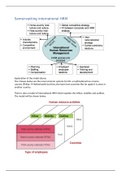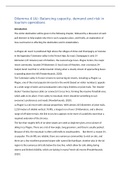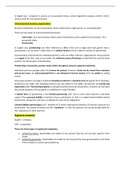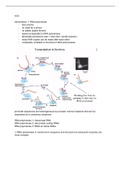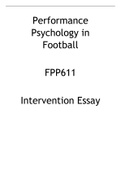CPR3701 16 OCTOBER 2024 Examination
MODULE CODE: cpr3701
DATE: 15 October 2024
OCTOBER NOVEMBER EXAMINATION 2024
QUALITY ANSWERS 💯💯💯💯💯💯💯💯💯
SECTION 1
1.1 The prosecutor’s view that the case should be heard in the district court is accurate.
In South Africa, the district court generally has jurisdiction over less severe crimes
(typically called “Schedule 1” offenses), including offenses punishable by imprisonment
for up to three years. Murder is classified as a serious offense and should be
prosecuted in the regional court, which has the authority to handle more serious cases,
including those potentially carrying a sentence of more than three years. Therefore, the
prosecutor’s assertion regarding the district court is incorrect, as murder charges should
be heard in the regional court.
1.2 H, A’s brother, may have locus standi to initiate a private prosecution. According to
section 7(1) of the CPA, a private individual may pursue a prosecution if the National
Prosecuting Authority (NPA) declines to do so. There is a requirement that H must serve
a notice of his intention to prosecute on the Director of Public Prosecutions (DPP). If H
has a sufficient interest in the matter—being the victim’s brother can be seen as that—
he is likely to have the standing to bring the private prosecution against C. However, the
circumstances under which the DPP declined the case would also influence his ability to
proceed.
1.3 Sergeant Nosey Kekana did not act within the law regarding C’s court appearance.
According to section 35(1)(d)(i) of the Constitution and section 50 of the CPA, an
arrested person must be brought before a court within 48 hours of their arrest. C was
arrested on Tuesday at 11h00 and was only brought to court on Thursday at 15h00,
exceeding the 48-hour requirement. This violation can lead to the case being affected
by issues related to unlawful detention or the admissibility of evidence obtained during
that period.
, 1.4 The charges relating to the alleged robbery of the Botswana People’s Bank (BPB)
cannot be tried in South Africa, as South African courts only have jurisdiction over
crimes committed within South African territory. Since the alleged robbery occurred in
Botswana, it falls under the jurisdiction of Botswana’s legal system. The prosecutor’s
unwillingness to extradite C to Botswana does not change the fact that the offense was
committed outside South African borders. Consequently, the charges may only be
pursued in Botswana.
1.5 The holding over of the proceedings in this case would be classified as
postponements rather than adjournments. In legal terms, a postponement refers to a
delay in proceedings to a future date, usually because the matter is not ready to
proceed, such as in this case for further investigations. An adjournment typically occurs
when a court session is temporarily halted but does not necessarily indicate that the
case itself is being put off to a later date for readiness issues. Since the matter is “held
over” for further investigation, it indicates that the prosecution itself is not prepared to
move forward, aligning more closely with a postponement.
SECTION 2
2.1 The situation involving Sergeants Skop Madonoro and Piet Pompies and the young
man D raises several important issues regarding lawful arrest as outlined in Section 39
of the Criminal Procedure Act (CPA). The interactions between the police officers and D
highlight critical concerns about the legality of the arrest and the rights individuals have
when approached by law enforcement.
To begin with, it's important to understand that police must have reasonable grounds to
suspect that a person is committing or has committed a crime for an arrest to be lawful.
In this instance, the officers stopped D without any clear evidence connecting him to the
gang fight they were investigating. Since D was running away from the altercation
instead of towards it, this further calls into question the justification for stopping him.
Simply fleeing from a scene does not provide adequate grounds for suspicion.
Additionally, Sergeant Madonoro’s reaction to D’s question about why he needed to
accompany them is troubling. His dismissive and threatening remarks—such as telling
D not to ask “nonsense” and implying he would "donner" him for non-compliance—
indicate a failure to maintain the professional standards expected of law enforcement.
This type of intimidation can pressure individuals into compliance and violates their right
MODULE CODE: cpr3701
DATE: 15 October 2024
OCTOBER NOVEMBER EXAMINATION 2024
QUALITY ANSWERS 💯💯💯💯💯💯💯💯💯
SECTION 1
1.1 The prosecutor’s view that the case should be heard in the district court is accurate.
In South Africa, the district court generally has jurisdiction over less severe crimes
(typically called “Schedule 1” offenses), including offenses punishable by imprisonment
for up to three years. Murder is classified as a serious offense and should be
prosecuted in the regional court, which has the authority to handle more serious cases,
including those potentially carrying a sentence of more than three years. Therefore, the
prosecutor’s assertion regarding the district court is incorrect, as murder charges should
be heard in the regional court.
1.2 H, A’s brother, may have locus standi to initiate a private prosecution. According to
section 7(1) of the CPA, a private individual may pursue a prosecution if the National
Prosecuting Authority (NPA) declines to do so. There is a requirement that H must serve
a notice of his intention to prosecute on the Director of Public Prosecutions (DPP). If H
has a sufficient interest in the matter—being the victim’s brother can be seen as that—
he is likely to have the standing to bring the private prosecution against C. However, the
circumstances under which the DPP declined the case would also influence his ability to
proceed.
1.3 Sergeant Nosey Kekana did not act within the law regarding C’s court appearance.
According to section 35(1)(d)(i) of the Constitution and section 50 of the CPA, an
arrested person must be brought before a court within 48 hours of their arrest. C was
arrested on Tuesday at 11h00 and was only brought to court on Thursday at 15h00,
exceeding the 48-hour requirement. This violation can lead to the case being affected
by issues related to unlawful detention or the admissibility of evidence obtained during
that period.
, 1.4 The charges relating to the alleged robbery of the Botswana People’s Bank (BPB)
cannot be tried in South Africa, as South African courts only have jurisdiction over
crimes committed within South African territory. Since the alleged robbery occurred in
Botswana, it falls under the jurisdiction of Botswana’s legal system. The prosecutor’s
unwillingness to extradite C to Botswana does not change the fact that the offense was
committed outside South African borders. Consequently, the charges may only be
pursued in Botswana.
1.5 The holding over of the proceedings in this case would be classified as
postponements rather than adjournments. In legal terms, a postponement refers to a
delay in proceedings to a future date, usually because the matter is not ready to
proceed, such as in this case for further investigations. An adjournment typically occurs
when a court session is temporarily halted but does not necessarily indicate that the
case itself is being put off to a later date for readiness issues. Since the matter is “held
over” for further investigation, it indicates that the prosecution itself is not prepared to
move forward, aligning more closely with a postponement.
SECTION 2
2.1 The situation involving Sergeants Skop Madonoro and Piet Pompies and the young
man D raises several important issues regarding lawful arrest as outlined in Section 39
of the Criminal Procedure Act (CPA). The interactions between the police officers and D
highlight critical concerns about the legality of the arrest and the rights individuals have
when approached by law enforcement.
To begin with, it's important to understand that police must have reasonable grounds to
suspect that a person is committing or has committed a crime for an arrest to be lawful.
In this instance, the officers stopped D without any clear evidence connecting him to the
gang fight they were investigating. Since D was running away from the altercation
instead of towards it, this further calls into question the justification for stopping him.
Simply fleeing from a scene does not provide adequate grounds for suspicion.
Additionally, Sergeant Madonoro’s reaction to D’s question about why he needed to
accompany them is troubling. His dismissive and threatening remarks—such as telling
D not to ask “nonsense” and implying he would "donner" him for non-compliance—
indicate a failure to maintain the professional standards expected of law enforcement.
This type of intimidation can pressure individuals into compliance and violates their right

